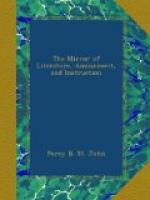Pontine Marshes.—Mr. Spence observes “the desolate aspect attributed to these twenty-four miles of the road between Rome and Naples is one of the many exaggerations which prevail with regard to Italy.” He describes the surface as dead-flat, with occasional portions covered with reeds, or overflowed with water, giving the whole a fenny character, yet, as happily, there are no pollard willows, and the road runs the whole way between two rows of tall elm trees, the general effect to the eye is not offensive, and far less repulsive than some parts of Holland or Lincolnshire.
Italian Landscapes.—The absence of fine full-grown trees is the great defect of landscape scenes in Italy, where you sometimes travel a hundred miles (as in Lombardy) without setting eyes on a tree that has not been pollarded or lopped.
Palming.—In the north of Italy palm-trees are cultivated, to sell their leaves to the Romish churches for Palm-Sunday.
Italian Climate.—The true Italian climate is confined to a very small portion of Italy, namely, to some favoured spots on the western coast. Here the approximation of the Apennines to the sea, at once keeps off the north and east winds, and reflecting the sun’s rays, affords the temperature which the orange, lemon, &c. require. The moment you recede from the coast, especially if a very trifling elevation of ground takes place, farewell to oranges and lemons at least in any perfection.
Sweet Lemon.—At Naples a curious variety of lemon is exposed in the streets for sale, having externally the exact colour and shape of an orange, except that at the stalk end is a depression, and on this a prominence, as in the lemon, but within having the pale pulp of the lemon, and sweet juice.
Economy.—In the square of the town of Caserta, Mr. Spence saw exposed for sale bundles of green lupine plants pulled up by the roots, and of the roots of couch grass, which we burn, but which the Italians more wisely give as a saccharine and grateful food to horses.
Campagna Felice is the title given to the extensive tract of land which lies between the mountains to the north-east of Caserta and Naples, and the Mediterranean. The whole is cultivated like a garden: rows of lopped elms or poplars intersect the fields, at the distance of 40 or 50 feet between each row, to which vines are trained: and the intermediate space is occupied by luxuriant wheat; lupines, pulled green for fodder; garden-beans; or ground prepared for ploughing by two oxen, without a driver, for Indian corn, &c. This is one of the grand advantages of the climate of Italy, that, while in northern Europe vast tracts of land are devoted to the exclusive growth of barley for beer, the Italians obtain a far better beverage from the very same land that supplies their bread corn, and without materially interfering with its produce: for both the vines and the trees that support them are planted so deep as to consume only the manure, which, in any case, would be washed away; and their slight shade is rather beneficial than injurious to the crops below.




